Unit 2 What time do you go to school? Section A Grammar Focus -3c 课件(共30张PPT)
文档属性
| 名称 | Unit 2 What time do you go to school? Section A Grammar Focus -3c 课件(共30张PPT) |

|
|
| 格式 | zip | ||
| 文件大小 | 4.7MB | ||
| 资源类型 | 教案 | ||
| 版本资源 | 人教新目标(Go for it)版 | ||
| 科目 | 英语 | ||
| 更新时间 | 2022-02-20 00:00:00 | ||
图片预览



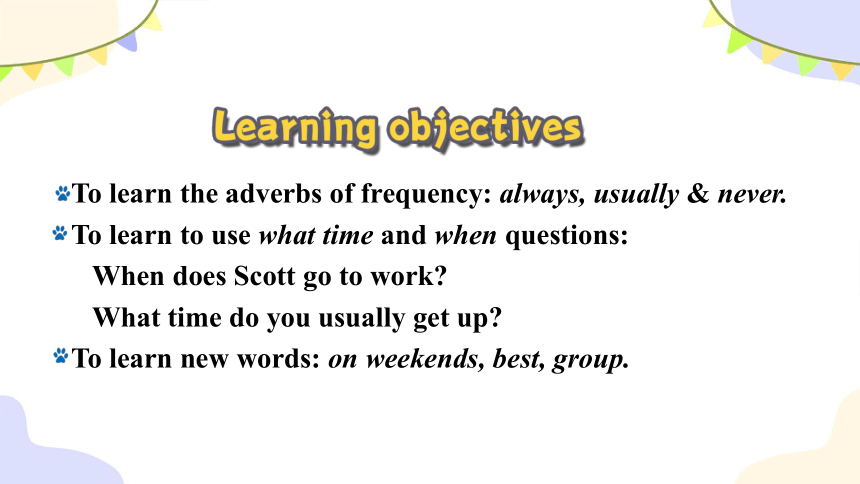

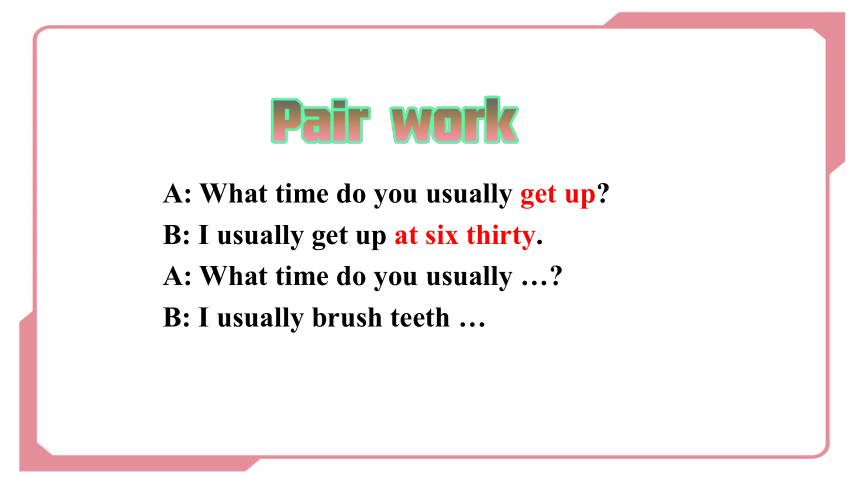

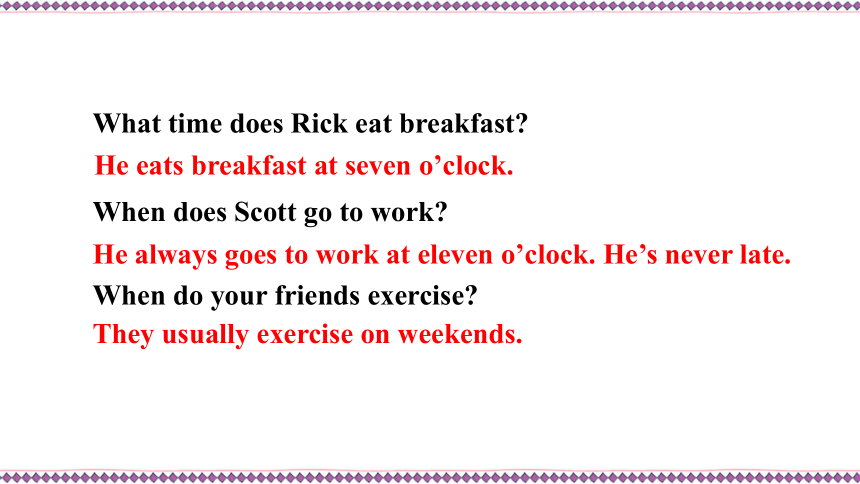
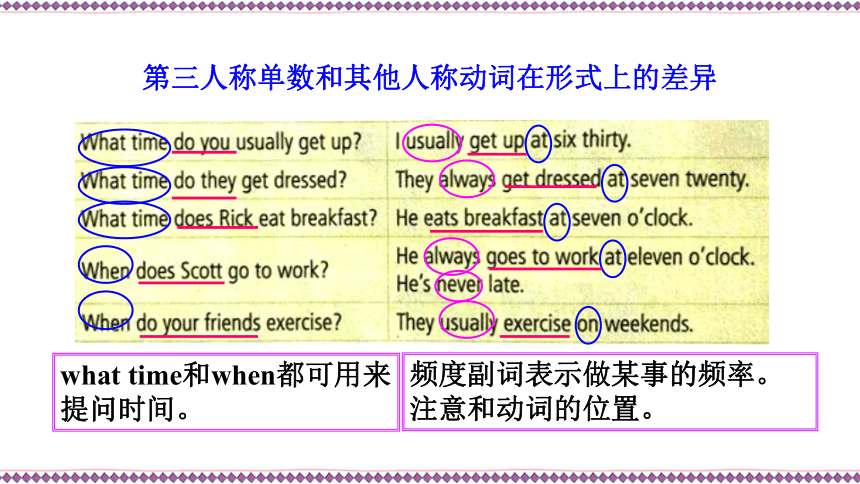
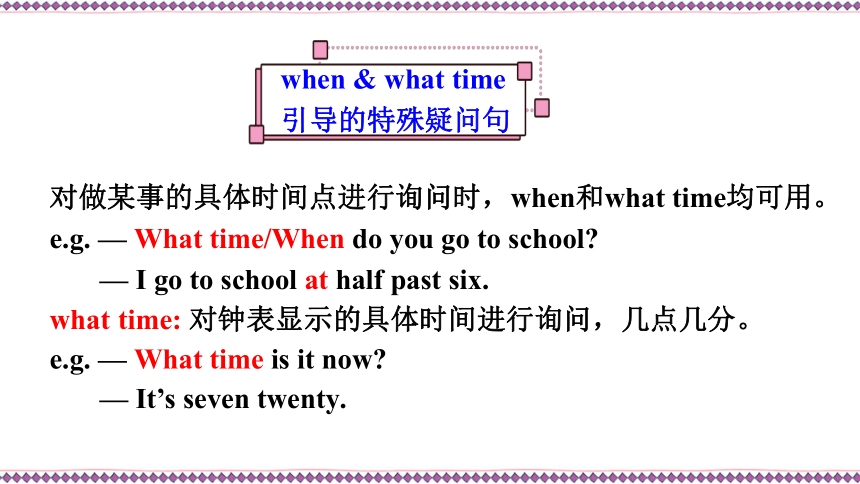

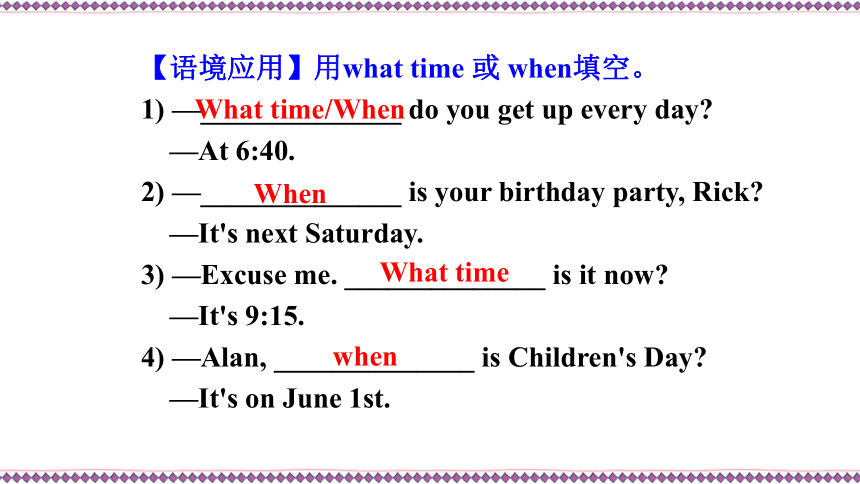
文档简介
(共30张PPT)
Unit 2
Unit 2
What time do you go to school
To learn the adverbs of frequency: always, usually & never.
To learn to use what time and when questions:
When does Scott go to work
What time do you usually get up
To learn new words: on weekends, best, group.
A
B
C
D
E
F
go to school
brush teeth
get up
eat breakfast
take a shower
get dressed
A: What time do you usually get up
B: I usually get up at six thirty.
A: What time do you usually …
B: I usually brush teeth …
问答做某事的时间
Read the following sentences.
I usually get up at six thirty.
What time do you usually get up
What time do they get dressed
They always get dressed at seven twenty.
He eats breakfast at seven o’clock.
When does Scott go to work
When do your friends exercise
He always goes to work at eleven o’clock. He’s never late.
They usually exercise on weekends.
What time does Rick eat breakfast
what time和when都可用来提问时间。
频度副词表示做某事的频率。注意和动词的位置。
第三人称单数和其他人称动词在形式上的差异
when & what time
引导的特殊疑问句
对做某事的具体时间点进行询问时,when和what time均可用。
e.g. — What time/When do you go to school
— I go to school at half past six.
what time: 对钟表显示的具体时间进行询问,几点几分。
e.g. — What time is it now
— It’s seven twenty.
when: 对事情发生的年、月、日及上午、下午或晚上等非钟点性时间询问。
e.g. — When did the story happen
— On the morning of January 10, 2021.
【语境应用】用what time 或 when填空。
1) —______________ do you get up every day
—At 6:40.
2) —______________ is your birthday party, Rick
—It's next Saturday.
3) —Excuse me. ______________ is it now
—It's 9:15.
4) —Alan, ______________ is Children's Day
—It's on June 1st.
When
What time/When
What time
when
汉译英。
1) ——你几点吃早餐?
——七点。
2) ——你们的学校旅行是什么时候?
——四月十日。
—When/What time do you have/eat breakfast
—At 7:00/seven o'clock.
—When is your school trip
—It's on April 10th. / On April 10th.
总是
通常
常常
有时
从未
100%
0%
usually
often
sometimes
never
always
频度副词:多久一次。是一种表示频繁程度的副词。常见频度副词按频率大小排列:
频度副词
Adverbs of Frequency
频度副词通常位于实义动词之前,be动词、情态动词或助动词之后。但sometimes和often还可以放在句首或句尾。如:
He is always happy at school.
The boy doesn’t usually play basketball.
Molly sometimes / often goes to the zoo on Sunday.
Sometimes / Often Molly goes to the zoo on Sunday.
Jack doesn’t go fishing very often.
Susan does some shopping with her dad sometimes.
Maria seldom has hamburgers for breakfast
You can never go out at night.
当对频度副词及表示事件发生频率的短语提问时,常用how often,意为“多久一次”。如:
I listen to music twice a week. (对划线部分提问)
How often do you listen to music
Ann never cooks dinner. (对划线部分提问)
How often does Ann cook dinner
1. What time do you get up on school days
______________________________
2. ______________________________
Rick always gets up at 6:20.
3. What time do you have breakfast
___________________________________
I usually get up at 6:30.
What time does Rick usually get up
I usually have breakfast at 6:45.
Write answers or questions. Use always, usually or never.
4. ___________________________________________
Anna never eats breakfast.
5. What time does your best friend go to school
___________________________________________
When/What time does Anna usually eat breakfast
She/ He always goes to school at 7:15.
Talk about something you always do, something you usually do and something you never do.
S1: I always… I usually… I never…
S2: I always… I usually… I never…
S3: I always… I usually… I never…
S4: I always… I usually… I never…
1. always
_____________________________________
2. usually
_____________________________________
3. never
_____________________________________
Write about something you always do, something you usually do and something you never do.
I always go to school at seven o’clock.
I usually play the guitar at 6:00 after school.
I never exercise in the evenings.
Interview three of your classmates. Find out what time they do these activities.
What time do they do these activities
Jenny S2 S3
get up on weekends 9:00
exercise 6:30
eat dinner 7:20
take a shower 21:00
go to school 7:40
In our group, Jenny usually gets up late on weekends. She gets up at __________________________________
_______________________________________________
_______________________________________________
_______________________________________________
_______________________________________________
nine o’clock. She always exercises at six thirty. She usually eats dinner at seven twenty.
She usually takes a shower at nine o’clock in the evening. She usually goes to school at seven forty on school days.
In our group, S1… S2… S3…
Give a report to the class.
1. What time does your best friend go to school
你最好的朋友几点去学校?
best adj. 最好的
adv. 最好地;最 good的最高级
e.g. My good friend is Jack, and he’s my best friend. (翻译)
Jack是我的好朋友, 他也是我最好的朋友。
2. In our group,… 在我们组,……
group n. 组,群
e.g. We have six students in our group.
A group of boys play football at night on weekends. (翻译)
我们小组里有六名学生。
一群男孩周末晚上踢足球。
3. What time do you get up on school days 上学日你几点起床?
They usually exercise on weekends. 他们通常在周末锻炼。
on school days 在上学日里
on weekends 在周末
e.g. 男孩们平时在学校打篮球,周末他们踢足球。(翻译)
The boys play basketball on school days, and they play football on weekends.
1. What time do you get up on school days
2. Rick always gets up at 6:20.
3. Anna never eats breakfast.
4. I usually get up at … o’clock.
get up on weekends, exercise, eat dinner, take a shower, go to school
Ⅰ. 用两种方式写出下列时间的英语表达。
1. 1:15 ____________________________
2. 10:30 ___________________________
3. 2:40 ____________________________
4. 8:05 ____________________________
5. 4:20 ____________________________
one fifteen; a quarter past one
ten thirty; half past ten
two forty; twenty to three
eight five; five past eight
four twenty; twenty past four
Ⅱ. 对下列句子中的划线部分进行提问。
1. We have lunch at 11:30 a.m.
________________________________
2. Jim usually plays basketball after school.
________________________________
3. They have an English test next week.
________________________________
4. The school trip is in October.
________________________________
5. It’s 3:15 p.m. _____________________________
When / What time do you have lunch
What does Jim usually do after school
When do they have an English test
When is the school trip
What time is it
1. 总结日常活动的英语表达方式。如:
go to school, get up, get dressed…
2. 询问你的朋友们日常活动的时间,写成对话。如:
—What time do you …
— I usually …
Unit 2
Unit 2
What time do you go to school
To learn the adverbs of frequency: always, usually & never.
To learn to use what time and when questions:
When does Scott go to work
What time do you usually get up
To learn new words: on weekends, best, group.
A
B
C
D
E
F
go to school
brush teeth
get up
eat breakfast
take a shower
get dressed
A: What time do you usually get up
B: I usually get up at six thirty.
A: What time do you usually …
B: I usually brush teeth …
问答做某事的时间
Read the following sentences.
I usually get up at six thirty.
What time do you usually get up
What time do they get dressed
They always get dressed at seven twenty.
He eats breakfast at seven o’clock.
When does Scott go to work
When do your friends exercise
He always goes to work at eleven o’clock. He’s never late.
They usually exercise on weekends.
What time does Rick eat breakfast
what time和when都可用来提问时间。
频度副词表示做某事的频率。注意和动词的位置。
第三人称单数和其他人称动词在形式上的差异
when & what time
引导的特殊疑问句
对做某事的具体时间点进行询问时,when和what time均可用。
e.g. — What time/When do you go to school
— I go to school at half past six.
what time: 对钟表显示的具体时间进行询问,几点几分。
e.g. — What time is it now
— It’s seven twenty.
when: 对事情发生的年、月、日及上午、下午或晚上等非钟点性时间询问。
e.g. — When did the story happen
— On the morning of January 10, 2021.
【语境应用】用what time 或 when填空。
1) —______________ do you get up every day
—At 6:40.
2) —______________ is your birthday party, Rick
—It's next Saturday.
3) —Excuse me. ______________ is it now
—It's 9:15.
4) —Alan, ______________ is Children's Day
—It's on June 1st.
When
What time/When
What time
when
汉译英。
1) ——你几点吃早餐?
——七点。
2) ——你们的学校旅行是什么时候?
——四月十日。
—When/What time do you have/eat breakfast
—At 7:00/seven o'clock.
—When is your school trip
—It's on April 10th. / On April 10th.
总是
通常
常常
有时
从未
100%
0%
usually
often
sometimes
never
always
频度副词:多久一次。是一种表示频繁程度的副词。常见频度副词按频率大小排列:
频度副词
Adverbs of Frequency
频度副词通常位于实义动词之前,be动词、情态动词或助动词之后。但sometimes和often还可以放在句首或句尾。如:
He is always happy at school.
The boy doesn’t usually play basketball.
Molly sometimes / often goes to the zoo on Sunday.
Sometimes / Often Molly goes to the zoo on Sunday.
Jack doesn’t go fishing very often.
Susan does some shopping with her dad sometimes.
Maria seldom has hamburgers for breakfast
You can never go out at night.
当对频度副词及表示事件发生频率的短语提问时,常用how often,意为“多久一次”。如:
I listen to music twice a week. (对划线部分提问)
How often do you listen to music
Ann never cooks dinner. (对划线部分提问)
How often does Ann cook dinner
1. What time do you get up on school days
______________________________
2. ______________________________
Rick always gets up at 6:20.
3. What time do you have breakfast
___________________________________
I usually get up at 6:30.
What time does Rick usually get up
I usually have breakfast at 6:45.
Write answers or questions. Use always, usually or never.
4. ___________________________________________
Anna never eats breakfast.
5. What time does your best friend go to school
___________________________________________
When/What time does Anna usually eat breakfast
She/ He always goes to school at 7:15.
Talk about something you always do, something you usually do and something you never do.
S1: I always… I usually… I never…
S2: I always… I usually… I never…
S3: I always… I usually… I never…
S4: I always… I usually… I never…
1. always
_____________________________________
2. usually
_____________________________________
3. never
_____________________________________
Write about something you always do, something you usually do and something you never do.
I always go to school at seven o’clock.
I usually play the guitar at 6:00 after school.
I never exercise in the evenings.
Interview three of your classmates. Find out what time they do these activities.
What time do they do these activities
Jenny S2 S3
get up on weekends 9:00
exercise 6:30
eat dinner 7:20
take a shower 21:00
go to school 7:40
In our group, Jenny usually gets up late on weekends. She gets up at __________________________________
_______________________________________________
_______________________________________________
_______________________________________________
_______________________________________________
nine o’clock. She always exercises at six thirty. She usually eats dinner at seven twenty.
She usually takes a shower at nine o’clock in the evening. She usually goes to school at seven forty on school days.
In our group, S1… S2… S3…
Give a report to the class.
1. What time does your best friend go to school
你最好的朋友几点去学校?
best adj. 最好的
adv. 最好地;最 good的最高级
e.g. My good friend is Jack, and he’s my best friend. (翻译)
Jack是我的好朋友, 他也是我最好的朋友。
2. In our group,… 在我们组,……
group n. 组,群
e.g. We have six students in our group.
A group of boys play football at night on weekends. (翻译)
我们小组里有六名学生。
一群男孩周末晚上踢足球。
3. What time do you get up on school days 上学日你几点起床?
They usually exercise on weekends. 他们通常在周末锻炼。
on school days 在上学日里
on weekends 在周末
e.g. 男孩们平时在学校打篮球,周末他们踢足球。(翻译)
The boys play basketball on school days, and they play football on weekends.
1. What time do you get up on school days
2. Rick always gets up at 6:20.
3. Anna never eats breakfast.
4. I usually get up at … o’clock.
get up on weekends, exercise, eat dinner, take a shower, go to school
Ⅰ. 用两种方式写出下列时间的英语表达。
1. 1:15 ____________________________
2. 10:30 ___________________________
3. 2:40 ____________________________
4. 8:05 ____________________________
5. 4:20 ____________________________
one fifteen; a quarter past one
ten thirty; half past ten
two forty; twenty to three
eight five; five past eight
four twenty; twenty past four
Ⅱ. 对下列句子中的划线部分进行提问。
1. We have lunch at 11:30 a.m.
________________________________
2. Jim usually plays basketball after school.
________________________________
3. They have an English test next week.
________________________________
4. The school trip is in October.
________________________________
5. It’s 3:15 p.m. _____________________________
When / What time do you have lunch
What does Jim usually do after school
When do they have an English test
When is the school trip
What time is it
1. 总结日常活动的英语表达方式。如:
go to school, get up, get dressed…
2. 询问你的朋友们日常活动的时间,写成对话。如:
—What time do you …
— I usually …
同课章节目录
- Unit 1 Can you play the guitar?
- Section A
- Section B
- Unit 2 What time do you go to school?
- Section A
- Section B
- Unit 3 How do you get to school?
- Section A
- Section B
- Unit 4 Don't eat in class.
- Section A
- Section B
- Unit 5 Why do you like pandas?
- Section A
- Section B
- Unit 6 I'm watching TV.
- Section A
- Section B
- Review of Units 1-6
- Unit 7 It's raining!
- Section A
- Section B
- Unit 8 Is there a post office near here?
- Section A
- Section B
- Unit 9 What does he look like?
- Section A
- Section B
- Unit 10 I'd like some noodles.
- Section A
- Section B
- Unit 11 How was your school trip?
- Section A
- Section B
- Unit 12 What did you do last weekend?
- Section A
- Section B
